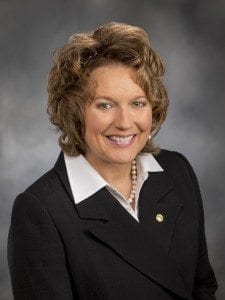Rep. Liz Pike

In the late afternoon and early evening of June 30, hours before the end of the state’s fiscal cycle, the Legislature passed a new 2017-19 operating budget.
Minutes before midnight, Gov. Jay Inslee signed the $43.7 billion spending bill into law, avoiding a state government shutdown. It was a repeat of exactly two years earlier when Gov. Inslee signed the 2015-17 operating budget into law, minutes before state government was set to shut down.
In both cases, the Legislature took nearly six months to write and adopt a budget — that included a 105-day regular session and three special sessions. We had hoped after the 2015 experience, in which state agencies were preparing contingency plans for a government shutdown, to avoid a “minutes-before-midnight budget.” Yet, history repeated itself again this year. Most concerning is some are accepting this as routine.
I will credit Republican and Democratic budget negotiators who worked hard this year — with the nearly impossible issue before them — to find and agree on a compromise solution that fully funds K-12 education and satisfies the state Supreme Court’s requirements under the McCleary decision. However, in the end, I voted against Senate Bill 5883 — the state operating budget measure. Here’s why:
The operating budget is the most important bill considered by the Legislature. Therefore, it should be the most transparent. It is YOUR money! You earned it first! And you should know the fine details of how it will be spent BEFORE the measure is enacted. So should every state lawmaker elected to represent you.
During the final negotiations, only a handful of legislators were privy to the important details of the new budget. Most of my legislative colleagues and I received the 616-page budget bill just hours before we voted on it. Because a final agreement wasn’t reached until a few days before the state’s fiscal cycle ended, transparency was replaced with haste — never a good thing when we are spending billions of dollars of your money.
The 2017-19 budget increases spending by more than $10 billion to $49.6 billion over the next four years. This is unsustainable, since it relies on one-time revenue sources, such as sweeping $328 million from dedicated accounts. This includes $254 million from the Public Works Assistance Account — which local governments rely upon to fund needed public works projects. This spending increase commits future legislatures to the unenviable position of raising taxes or making drastic cuts if the state’s economy recedes.
Although Republican negotiators blocked $8 billion of proposed taxes on energy, business and real estate, elimination of the border tax exemption, and a capital gains income tax, this new state operating budget relies on other tax increases. These include a $1.6 billion increase in the state property tax (House Bill 2242), an Internet sales tax and a new sales tax on bottled water and self-produced fuel (House Bill 2163). This is in addition to nearly $3 billion of new income from a recovering economy. These increases prove state government is not living within its means. I voted against both House Bill 2242 and House Bill 2163.
I believe we can do better.
One solution is for the Legislature to prioritize its work by finishing important budget matters first — ahead of all secondary policy issues. This would dramatically streamline legislative action. If policies were not funded in the budget, they would not advance further in the session, saving staff time, resources and precious taxpayer dollars.
A “budget first” session that imposes new, strict budget deadlines would require real change, discipline, and bold leadership. It would avoid the pitfalls we fell into this year because the clock ran out, ensuring better transparency and effective planning for future sustainability that could help us avoid tax increases.
Rather than accepting special sessions and end of fiscal year “minutes-before-midnight budgets” as routine, let’s reform our budgeting process by wisely using regular sessions (105 days in odd years/60 days in even years) to introduce, negotiate and pass our state operating budgets with full public view. It’s your money. You deserve no less, and we will all be better served for it.
Rep. Liz Pike, R-Camas, represents the 18th Legislative District.




